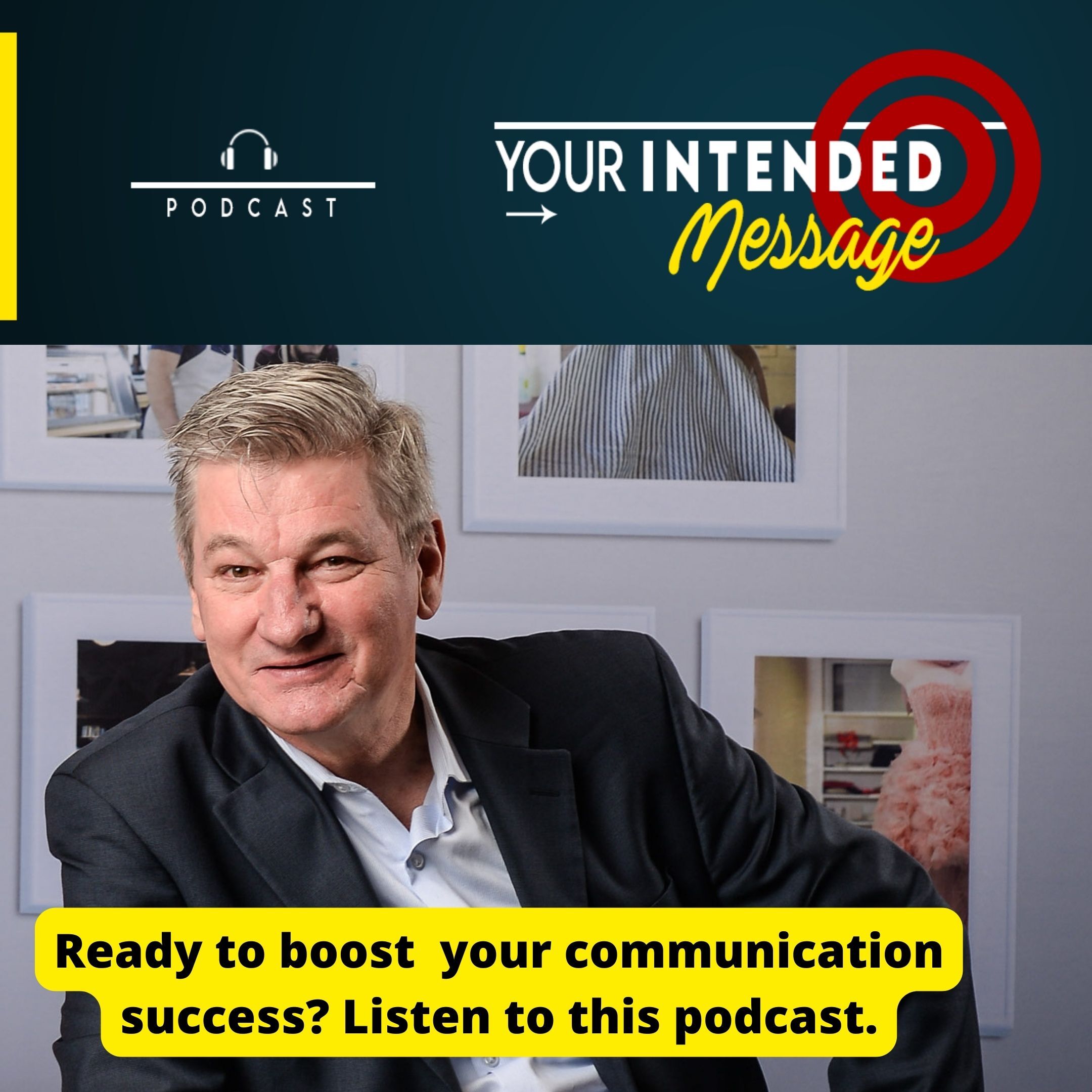
17.1K
Downloads
289
Episodes
The podcast about Effective Communication in Business
Better communication skills will advance your career and business. Are you ready to enhance your understanding and results from better communication? Listen and learn how to deliver Your Intended Message.
Are you willing to cross-examine communication from various perspectives? Would you like to deliver your intended message more effectively?
Listen to Your Intended Message to gain a powerful advantage in your ability to convey your message to your audience, team, clients or marketplace.
Learn from the mistakes and success of communication experts from around the world from different scenarios.
The better communicator has the competitive advantage.
Imagine what that means to you when you improve the success of your next conversation, presentation or message.
Your Host - George Torok
Episodes
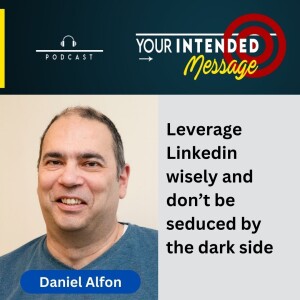
Thursday Mar 27, 2025
Rethink your LinkedIn Strategy: Daniel Alfon
Thursday Mar 27, 2025
Thursday Mar 27, 2025
Common Linkedin mistakes you can avoid
Build a Linkedin Network that generates revenue
Episode 250 (Daniel is based in Israel)
-----
In this conversation, we explore…
-
Why your personal LinkedIn profile is more valuable than your company page
-
The truth about connection quantity vs. quality
-
How to turn LinkedIn invitations into sales conversations
-
Why vanity metrics won’t grow your business
-
When and why not to post on LinkedIn
-
How to use mutual connections for warm introductions
-
Why following is better than connecting—at first
-
The most effective way to update your profile
-
How to build meaningful, sustainable LinkedIn relationships
-
The surprising reason your last presentation fell flat—and how to fix it
-----
About our guest, Daniel Alfon:
Daniel helps business owners how to gain new clients with the power of Linkedin. He is author of "Build a Linkedin Profile for Business Success".
You can arrange a private one-to-one coaching session to review your Linkedin profile and approach here.
Key Learning Points
-
Your personal LinkedIn profile is more important than your company page.
-
Connections should be based on quality, not quantity.
-
LinkedIn can work without posting—relationship-building matters more.
-
Don't accept all invites—assess the lead before connecting.
-
Vanity metrics (likes, followers) don’t drive revenue.
-
Use mutual connections to request introductions.
-
End presentations with a strong message, not Q&A.
-
“What's in it for me?” should drive your messaging.
-
Use LinkedIn milestones (birthdays, job changes) to maintain real connections.
-
Your LinkedIn profile needs regular feedback and updating to stay aligned with your business.
-----
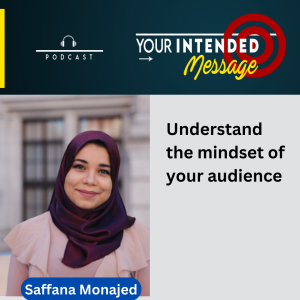
Thursday Mar 20, 2025
What is the mindset of your audience? Saffana Monajed
Thursday Mar 20, 2025
Thursday Mar 20, 2025
Identify the core truth of your marketing message
Avoiding Confirmation Bias in Your Messaging
Episode 249 (Saffana is based in London, England)
-----
In this conversation we explore…
- How audience mindset shapes effective copywriting
- Discovering your brand’s core truth
- Using timing strategically to enhance marketing results
- The hidden influence of confirmation bias in marketing
- Leveraging data to uncover actionable audience insights
- How to avoid projecting your assumptions onto your audience
- Strategies for unique and impactful product positioning
- Why it’s essential to understand who won’t buy from you
- Techniques to transform products from “nice-to-haves” into essentials
- The importance of removing ego from the copywriting process
-----
About our guest, Saffana Monajed:
Saffana conducts workshops to help your marketing team write more persuasive copy.
She has completed two marathons and plans to run an ultra-marathon.
As a math major she brings that appreciation to understand the data that determines best marketing practices.
Learn more about Saffana and her copywriting services and training at:
https://www.instagram.com/saffanabanana
https://www.tiktok.com/@learncopywritingnow
-----
Key Learning Points from this conversation with Saffana Monajed:
- Audience Mindset Drives Copywriting Success
- Discover and Communicate Your Core Truth
- Timing is Critical in Marketing
- Beware of Confirmation Bias
- Data Analysis Reveals Audience Insights
- Avoid Projecting Your Assumptions onto Your Audience
- Effective Product Positioning is About Being Unique
- Understand Who Won’t Buy and Why
- Transform Your Product from a Vitamin to a Painkiller
- Remove Ego from Your Writing Process
-----
Read the rest of this entry »
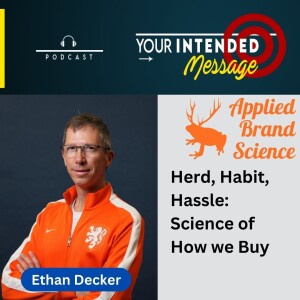
Wednesday Mar 12, 2025
The Science vs. Art of Marketing: Ethan Decker
Wednesday Mar 12, 2025
Wednesday Mar 12, 2025
The Myth of Brand Loyalty
Herd, Habit, Hassle: The Science Behind Consumer Behavior
Episode 248 (Ethan is based in Boulder, Colorado)
-----
In this conversation we explore:
-
The science behind consumer behavior and brand growth.
-
Why brand loyalty is often misunderstood and overrated.
-
How frequency of purchase correlates directly with customer numbers.
-
Three core factors driving purchasing decisions: Herd, Habit, and Hassle.
-
The critical role of hassle reduction in customer retention.
-
The importance of consistency in advertising for brand recognition.
-
How humor enhances advertising effectiveness by improving memorability.
-
The difference between visual branding ('little b') and overall brand perception ('big B').
-
Why marketers should rely on universal marketing principles rather than frequently changing tactics.
-
Practical strategies for creating memorable, "sticky" ads.
-----
About our guest, Ethan Decker:
Ethan is a brand strategist and marketing expert who has spent 20 year creating award-winning brand strategy, advertising and marketing research for some of the world's biggest brands.
A scientist by training and a marketer by trade, he's the missing link between science and creativity.
----
Key Learning Points from Ethan Decker:
- Brand loyalty is overrated. Real growth comes from increasing your customer base rather than deepening loyalty.
- Three forces drive customer behavior: Herd (social influence), Habit (routine buying), and Hassle (avoiding inconvenience).
- Frequency of purchase correlates directly with how many customers you have, not how loyal they are.
- Sticky advertising—ads that are memorable and clearly linked to your brand—significantly boosts customer recall.
- Humor can make ads memorable, but it must be used thoughtfully to avoid alienating customers.
- Consistency in branding builds recognition and customer trust more effectively than frequent changes.
- Customer buying decisions are influenced primarily by ease, familiarity, and social proof—not brand love.
- Great marketing combines art and science—science provides structure; creativity makes it memorable.
- Marketers have limited control over influencing how often customers buy; external factors play a bigger role.
- Successful brands balance ‘little b’ branding (visual elements) with overall reputation and perception (Big B brand).
-----
Read the rest of this entry »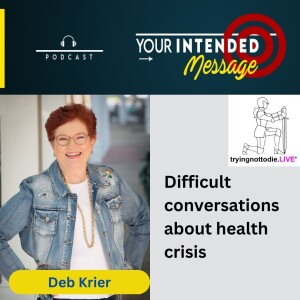
Thursday Mar 06, 2025
Communication Lessons from Cancer Survivor: Deb Krier
Thursday Mar 06, 2025
Thursday Mar 06, 2025
What to Say (and Not Say) to Someone Facing a Health Crisis
Navigating Tough Conversations: Lessons from a Cancer Warrior
Episode 246 (Deb is based in Atlanta, Georgia
In this conversation we explore:
- How to communicate effectively during a personal crisis
- The challenges of sharing personal health struggles with others
- Why specificity in communication leads to better support
- How to support someone facing a serious illness in a meaningful way
- The role of humor in dealing with difficult situations
- How to advocate for yourself in the medical system
- The common mistakes people make when trying to offer support
- How business leaders should communicate a personal health crisis to their team
- What employers can do to support employees facing serious health challenges
- How facing adversity reshapes life perspectives and priorities
-----
About our guest Deb Krier:
Deb is a three-time cancer survivor...or warrior as she prefers. The cancers were breast, basal cell carcinoma and thyroid cancer.
She has an MBA and a masters in communication. She founded her marketing firm, Wise Woman Communication in 2009.
You can obtain the Bear Hug Care package here. For a 10% discount, use the coupon code 10special.
https://tryingnottodie.live/bear-hug-care-package/
-----
Key Learning Points from the Podcast
-
The Challenge of Sharing Personal Struggles
- Many people hesitate to share their diagnosis due to fear of judgment or burdening others.
-
The Importance of Specificity in Communication
- Instead of vague offers to help, being specific about what you can do makes a real difference.
-
How to Support Someone Facing a Serious Illness
- Simple gestures, like sending a card or making a concrete offer, are more helpful than vague sympathy.
-
The Role of Humor in Coping with Difficult Situations
- Humor can be a powerful tool for dealing with hardship, but it should come from the person experiencing it.
-
Advocating for Yourself in the Medical System
- Patients need to be proactive, ask questions, and not hesitate to push for answers from healthcare providers.
-
The Pitfalls of Saying "I Know How You Feel"
- Everyone’s experience is different, and assuming you understand their emotions can be dismissive.
-
How Business Leaders Should Communicate a Health Challenge
- Transparency is key—sharing information directly helps prevent rumors and misinformation.
-
What Employers Can Do to Support an Employee Facing a Health Crisis
- Providing mental health resources and flexibility in work arrangements can make a big impact.
-
The Power of Living in the Present
- Facing a serious illness often shifts one’s priorities toward making the most of every day.
-
Why Words Matter More Than Ever in Difficult Times
- Thoughtful, intentional communication helps people feel supported rather than isolated.
-----
Read the rest of this entry »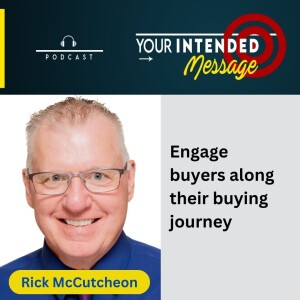
Thursday Feb 27, 2025
The Buyer Journey for Technology: Rick McCutcheon
Thursday Feb 27, 2025
Thursday Feb 27, 2025
Selling Digital Solutions: Lessons for Microsoft Partners
Episode 245 (Rick is based in the Toronto area)
In this conversation we explore:
- How the buyer journey has changed – Why modern buyers are 80-90% through the process before engaging with sales.
- The importance of adapting sales presentations – How to tailor messaging for Microsoft, ISVs, SI partners, and end customers.
- Why sales professionals must become guides, not just sellers – Understanding the shift from sales pitches to consultative selling.
- The role of content in sales success – How different types of content (videos, white papers, case studies) attract different buyer personas.
- How to research meeting participants to improve sales conversations – Using LinkedIn and meeting invites to personalize communication.
- The three buyer personas in tech sales – The technical buyer, the business buyer, and the economic buyer, and how to address each.
- Common mistakes salespeople make in their presentations – Why using the same sales deck for every audience is a bad strategy.
- The necessity of a structured sales process – Using frameworks like CCR (Circumstance, Challenge, ROI) to guide buyers.
- How to nurture leads that aren’t ready to buy yet – Why a lack of response doesn’t mean they’re uninterested.
- Partner relationship strategies – How to communicate effectively with Microsoft, resellers, and ISVs to strengthen collaboration.
-----
About our guest, Rick McCutcheon:
Rick has award the Microsoft MVP designation 11 times under the category of business applications. MVP stands for Most valuable professional.
He works with Microsoft business partners, both ISV and SI/VARs.
He hosts the podcast, Partner Talks and has published over 240 episodes over the last four years.
Listen to PartnerTalks.com
Learn more about Full Contact Selling
-----
Key Learning Points from the Podcast
- Understanding the Buyer Journey – Buyers today do extensive research before engaging with sales professionals. Sales teams must adapt to this shift.
- Tailoring Your Message to Different Audiences – ISVs, SI Partners, Microsoft, and customers each need a different approach.
- Content is Key to Sales Success – Effective content marketing attracts potential buyers and moves them through the sales funnel.
- The Role of Sales as a Guide, Not a Pitchman – Sales professionals should act as trusted advisors rather than aggressive sellers.
- Customizing Presentations for Different Stakeholders – Sales decks should be adapted based on whether the audience includes technical, business, or economic buyers.
- The Importance of Researching Meeting Participants – Checking LinkedIn and attendee lists ensures tailored messaging for decision-makers.
- Common Sales Mistakes That Kill Deals – Using the same generic sales deck, failing to understand the buyer’s journey, and pushing a hard sell.
- Why White Papers and Videos Work – Different types of content appeal to different buyer personas (technical, business, and economic).
- Avoiding Lead Misinterpretation – Researchers may never reply to a salesperson, but that doesn’t mean their company isn’t interested.
- Best Practices for Partner Relationship Management – Effective communication strategies for working with Microsoft and resellers.
-----
Read the rest of this entry »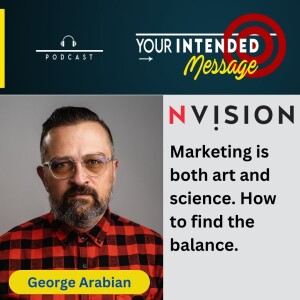
Thursday Feb 20, 2025
Holistic Digital Marketing that Works: George Arabian
Thursday Feb 20, 2025
Thursday Feb 20, 2025
Beyond SEO: The Seven Stages of Marketing Success
How Perception Shapes Marketing (More Than Facts Do)
Episode 244 (George is based in the Toronto area)
In this conversation we explore:
- The concept of holistic digital marketing and how it differs from traditional marketing approaches.
- The seven stages of the customer journey and why businesses should focus beyond conversion.
- The role of client advocacy and how turning customers into brand ambassadors reduces acquisition costs.
- Why marketing is both an art and a science and how to balance creativity with data-driven decisions.
- Common mistakes businesses make in marketing and how to align strategies with business goals.
- How AI is changing digital marketing and why human creativity still matters.
- The importance of emotional triggers in marketing and how psychology influences buying decisions.
- The power of perception in marketing and why it can be more influential than facts.
- The pitfalls of generic outreach and how personalized messaging improves response rates.
- How to design a marketing strategy that starts with outcomes rather than tactics.
About our guest, George Arabian:
George has over 25 years experience in marketing starting with his first website in 1996 when the Internet was in it's infancy.
George is the founder and CEO of NVISION, one of Canada's top digital marketing agencies. NVISION is known for combining consulting and executive while focusing on lead generation and brand awareness for mid-market B2B clients in manufacturing, professional services and technology.
Learn more about NVISION here https://nvision.co/
Follow George Arabian on Linkedin here https://www.linkedin.com/in/georgearabian/
-----
Key Learning Points
-
Holistic Digital Marketing Defined
- Goes beyond omnichannel strategies to focus on the full customer journey.
- Involves digital touchpoints that engage prospects from awareness to advocacy.
-
The Seven Stages of the Customer Journey
- Awareness → Consideration → Conversion → Engagement → Adoption → Retention → Advocacy.
- Many businesses stop at conversion, missing out on advocacy benefits.
-
The Power of Client Advocacy
- The best customers are those who promote you.
- Encouraging referrals and testimonials lowers acquisition costs.
-
Marketing is Both Art and Science
- Science: Understanding algorithms, analytics, and user behavior.
- Art: Crafting compelling messages, visuals, and emotional appeals.
-
Why Most Businesses Don’t Know If Their Marketing Works
- Many invest in tactics without tracking real business outcomes.
- Successful marketing must align with company goals, not just vanity metrics.
-
AI’s Role in Digital Marketing
- AI is a tool, not a replacement for authentic messaging.
- It can enhance efficiency but lacks human creativity and emotional depth.
-
Emotional Triggers Drive Marketing Success
- People buy based on emotions, not logic.
- Using words and imagery that resonate with customers increases engagement.
-
Personalization and Perception Matter More Than Facts
- The way customers feel about a brand determines loyalty more than product specs.
- Example: Converse sending personalized birthday discounts builds advocacy.
-
The Pitfalls of Generic Outreach
- Cold, AI-generated LinkedIn messages and impersonal pitches fail.
- Authenticity and research in outreach make a difference.
-
Marketing Should Start with Outcomes, Not Tactics
- Instead of asking, “Do I need SEO?” businesses should ask, “What is my goal?”
- Clear objectives help marketing agencies design effective strategies.
-----
Read the rest of this entry »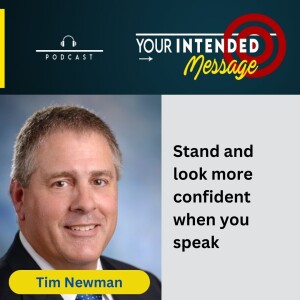
Thursday Feb 13, 2025
Sound and Look more Confident: Tim Newman
Thursday Feb 13, 2025
Thursday Feb 13, 2025
Breaking the Fear of Judgment
Overcoming the Fear of Public Speaking: Baby Steps to Confidence
Episode 243 (Tim is based in Hilton Head, South Carolina)
In this conversation we explore:
- The Root of Public Speaking Fear – Understanding why the fear of judgment holds so many back.
- How to Overcome Stage Fright – Proven techniques for managing nervousness before and during a speech.
- The Role of Preparation in Confidence – Why practicing like an athlete is the key to success.
- How to Sound and Look More Confident – Simple strategies to project confidence, even when you don’t feel it.
- Mindset Shifts for Public Speaking Success – How small mental adjustments can transform your speaking ability.
- Why Mistakes Make You More Relatable – The surprising way imperfections help connect with an audience.
- Engaging the Audience from the Start – Effective opening techniques that grab attention immediately.
- The Power of Storytelling and Rhetorical Questions – How these tools captivate listeners and keep them engaged.
- The Importance of Audience Research – Why knowing your audience should come before crafting your message.
- Using Personal Rituals to Reduce Anxiety – How a ‘walk-up song’ or a simple pre-speech routine can boost confidence.
----
About our guest, Tim Newman:
Tim earned a Doctorate in Education in Sport Management from the United States Sports Academy and has been teaching at the undergraduate and graduate level for over 20 years. His expertise is is Sport Marketing and Public Relations.
He created the Formula for Public Speaking to help young professionals become better communicators.
You can check out his course at Formula for Public Speaking
Use the coupon code YIM50OFF to save 50% on this course.
Follow the Speaking with Confidence Podcast
-----
Key Learning Points from the Podcast
-
Fear of Public Speaking Stems from Fear of Judgment
- Many speakers fear being judged, but most audiences want to see the speaker succeed.
-
Nervousness Never Truly Disappears—Learn to Manage It
- Even experienced speakers and athletes feel jitters; preparation is key to handling them.
-
Practice is Essential—You Wouldn’t Compete Without Training
- Just like in sports, speaking success comes from consistent preparation.
-
Mindset Shift is Critical to Confidence
- A change in mindset, from fear to purpose, helps speakers become more effective.
-
Mistakes Are Natural and Can Help You Connect with the Audience
- Audiences appreciate speakers who push through struggles rather than appearing perfect.
-
Engagement Starts with the First Two Minutes
- A strong opening sets the tone; use questions, humor, or audience acknowledgment.
-
Preparation and Authenticity Create a Confident Sounding Voice
- Know your content, be yourself, and avoid trying to change your natural voice.
-
A Walk-Up Song or Ritual Can Help You Get in the Right Mindset
- Just like athletes have pre-game rituals, speakers can use music or mental exercises.
-
Storytelling and Rhetorical Questions Engage the Audience
- Beginning with a thought-provoking question or story draws people in immediately.
-
Audience First: Know Who They Are Before Crafting Your Message
- Content should be tailored to the audience, not just what the speaker wants to say.
-----
Read the rest of this entry »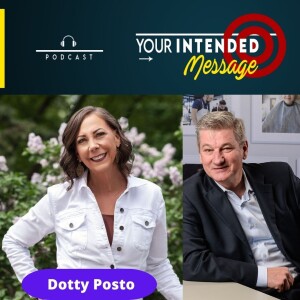
Saturday Feb 08, 2025
How to save Toxic Leaders: Dotty Posto
Saturday Feb 08, 2025
Saturday Feb 08, 2025
Fixing Toxic Leadership: How to Coach Difficult Leaders Back on Track
Leadership Challenges: When High Performers Push People Away
Episode 242 ( Dotty is based in Milwaukee. Repeat of episode 192)
In this conversation we explore:
- The challenges of leadership development – Why some leaders struggle despite their experience.
- How organizations decide whether to invest in leadership coaching – What factors indicate a leader is worth saving.
- Why high performers can still be destructive – The hidden costs of results-driven leadership.
- The most common toxic leadership behaviors – Overpowering, micromanaging, dismissing feedback, and creating fear.
- How personal triggers affect leadership style – The role of stress, past experiences, and subconscious reactions.
- The power of feedback and self-awareness – How leaders can recognize and change harmful behaviors.
- The role of gender in leadership feedback – How women are often labeled "too aggressive" or "too emotional."
- How to foster constructive workplace conflict – Encouraging open discussion without personal attacks.
- Strategies for team members dealing with difficult leaders – How colleagues can provide feedback without confrontation.
- Practical steps for leaders to balance authority with empathy – Tools and techniques for creating a more positive impact.
-----
About our guest, Dotty Posto:
Dotty Posto helps CEOs and Senior Leaders ignite their stagnant culture to inspire their people to outstanding performance.
Dotty began her coaching and consulting business after working in Organizational Development for Fortune 500 companies such as The Chicago Tribune, Aon-Hewitt and Harley-Davidson Motor Company.
Dotty’s clients say, through their work with her, they’ve experienced new levels creativity, effectiveness, and well-being...without the struggle they'd become accustomed to.
Learn more about Dotty and her services at her website
You can find a free Energy Assessment and the free videos for Leadership Development.
-----
Key Learning Points from the Interview
-
Leaders Can Change, But Only If They’re Open to It
- A company must be committed to supporting a leader’s growth, and the leader must be willing to receive feedback and change.
-
Toxic Behavior in Leaders Often Comes from Personal Triggers
- Leaders who struggle with workplace interactions are often reacting from a place of personal stress, past experiences, or subconscious triggers.
-
High Performance Doesn’t Justify Poor Behavior
- A leader may be delivering results, but if they create a toxic environment, the overall impact on the team and company is negative.
-
Common Signs of Poor Leadership
- Leaders who overpower conversations, micromanage, dismiss feedback, or create fear among their teams.
-
Feedback Culture is Key to Leadership Success
- Constructive feedback should be built into an organization’s culture, ensuring leaders receive honest input and can adjust accordingly.
-
The Power of Self-Observation and Accountability
- Leaders must recognize their own patterns of behavior and work with trusted colleagues for real-time feedback.
-
Emotions Play a Role in Leadership, But Shouldn’t Control It
- Women, in particular, often receive conflicting feedback (too aggressive vs. too emotional), and they need to find their own authentic balance.
-
Leaders Must Learn to Separate Issues from Individuals
- Workplace debates should be about the idea, not the person. Leaders must be skilled at discussing disagreements without making them personal.
-
Team Members Can Influence Leadership Behavior
- Employees can tactfully question and provide feedback to difficult leaders, helping guide them toward better workplace interactions.
-
Healthy Workplace Cultures Are Built on Trust and Constructive Conflict
- Leaders should encourage open discussion, embrace challenges, and create a space where their teams feel safe speaking up.
-----
Read the rest of this entry »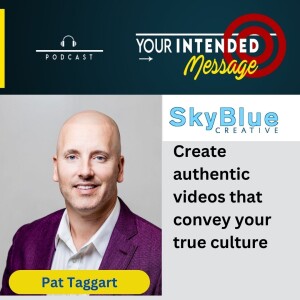
Thursday Jan 30, 2025
How to Make Authentic Business Videos: Pat Taggart: Pat Taggart
Thursday Jan 30, 2025
Thursday Jan 30, 2025
Overcoming camera anxiety to boost confidence
Why corporate videos fail: The Power of Unscripted Content
Episode 241 (Pat is based in Philadelphia)
In this conversation, we explore..."
- The Pitfalls of Traditional Corporate Videos – Why scripted corporate videos often fail to connect with audiences.
- The Power of Unscripted Content – How authentic storytelling makes business videos more engaging.
- Overcoming Camera Anxiety – Why people freeze on camera and how to help them relax.
- The Purpose of Business Videos – How to create videos that solve problems or seize opportunities.
- The Role of Storytelling in Recruiting Videos – Why showcasing culture honestly attracts the right employees.
- What Makes a Business Video Effective – Tips on video length, engagement, and editing.
- Why Over-Preparation Hurts Video Authenticity – The benefits of trusting the process and allowing natural conversations.
- How to Use Video to Improve Hiring and Retention – Filtering candidates through transparent company culture stories.
- The Importance of Editing in Business Videos – How to refine hours of footage into a compelling final cut.
- The Human Element in Video Marketing – The role of humor, music, and emotion in making content memorable.
-----
About out guest, Pat Taggart:
Pat has been creating authentic, unscripted content for business for 23 years. He detests the traditional corporate videos and his goal is to create the polar opposite. You can learn more about Pat and his video services at
https://www.skybluecreative.com/
-----
Key Learning Points
1. The Problem with Traditional Corporate Videos
- Corporate videos often feel scripted, unnatural, and intimidating.
- Employees struggle to sound genuine when reading a script.
2. The Power of Unscripted, Authentic Content
- Genuine conversations help businesses tell better stories.
- The best videos mine existing stories instead of forcing a narrative.
3. Overcoming Camera Intimidation
- People dislike hearing their own voices and seeing themselves on video.
- The solution: stop consuming your own content—it’s for the audience, not for you.
4. Video’s Purpose in Business
- A video should solve a business problem or capitalize on an opportunity.
- If it doesn't achieve these goals, it's not worth creating.
5. The Importance of Storytelling in Recruiting Videos
- Culture stories should come from employees, not just leadership.
- Highlighting who isn’t a fit is just as important as attracting the right talent.
6. How to Make a Business Video More Engaging
- Keep it as short as possible without losing the message.
- Use bloopers and humor to make content feel more human.
- Music plays a key role in setting the emotional tone of a video.
7. Why Over-Preparation Hurts Video Content
- The more someone prepares specific lines, the more robotic they sound.
- The best content comes from spontaneous, real conversations.
8. The Role of Editing in Crafting a Strong Message
- A successful two-minute video might come from hours of footage.
- Editing ensures only the most compelling moments remain.
9. How Videos Can Improve Employee Retention
- Accurately showcasing company culture prevents bad hires.
- Transparency helps employees self-select the right workplace.
10. Simple Ways to Improve On-Camera Performance
- Positive reinforcement helps subjects relax.
- The interviewer’s energy influences the interviewee’s energy.
-----
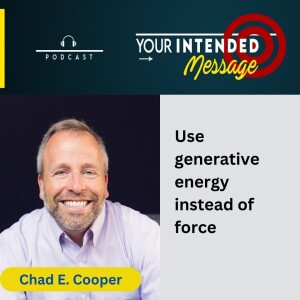
Thursday Jan 23, 2025
Secrets of High Performers: Chad E. Cooper
Thursday Jan 23, 2025
Thursday Jan 23, 2025
Why do billionaires need coaching and how does that help you?
Mastering Force vs. Generative Energy
Episode 240 (Chad is based in Florida)
In this conversation with Chad E. Cooper we explore:
- The distinction between serving and selling, especially when working with high performers like billionaires and Olympians.
- The connection between spiritual growth and material success.
- How to identify and close gaps in personal and professional development.
- The transition from force energy to generative energy in achieving lasting success.
- The role of purpose-driven actions in leadership and performance.
- Practical strategies for time management and avoiding burnout.
- Building empathy and compassion as key components of effective leadership.
- The importance of unattachment to external validation in maintaining self-worth.
- Why discomfort is essential for success and how to avoid unnecessary suffering.
- The power of focusing on spiritual intimacy to strengthen all aspects of life.
-----
About our guest, Chad E. Cooper:
Chad is a coach to high-performers of several industries, billionaires, professional athletes, Gold medal Olympians and amazing entrepreneurs.
His experiences includes high-performances as an entrepreneur, athlete and in the military.
He is the author of, "Time Isn't the Problem".
To learn more about Chad, his coaching and his book, visit:
-----
Key Learning Points
-
Difference Between Serving and Selling
- Approach interactions with a mindset to listen and fill gaps, rather than pushing an agenda.
-
Force vs. Generative Energy
- High performers often rely on force energy but thrive better when transitioning to generative energy.
-
Spiritual Intimacy and Its Role in Fulfillment
- True joy and peace come from internal spiritual connection, not external achievements.
-
The Importance of Purpose
- Purpose-driven actions provide clarity, motivation, and resilience during challenges.
-
Compartmentalizing and Setting Boundaries
- Emotional health and effective leadership require compartmentalizing stress and focusing on controllable factors.
-
Navigating Challenges Through Resilience
- Discomfort is part of success, but suffering is optional and often tied to our narratives.
-
Unattachment to External Validation
- Success comes from focusing on personal purpose, not the praise or criticism of others.
-
Empathy and Compassion in Leadership
- High performers thrive when they integrate empathy and understanding into their decision-making processes.
-----
Read the rest of this entry »